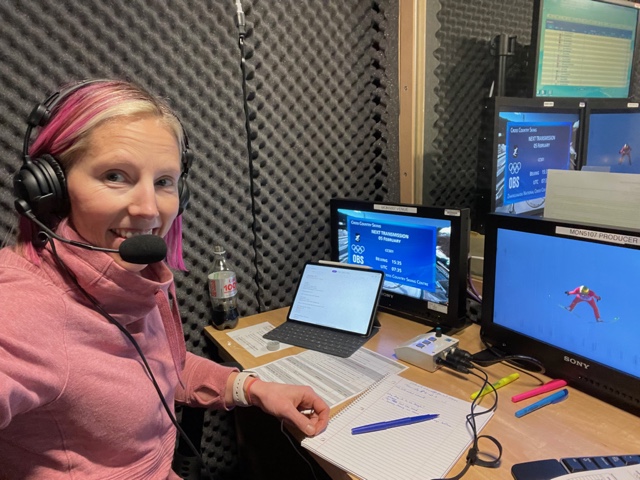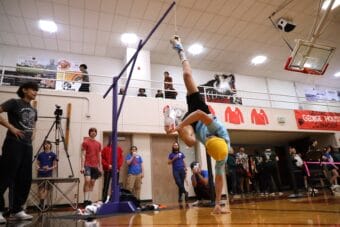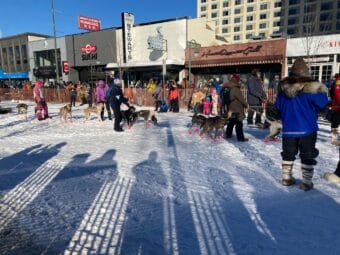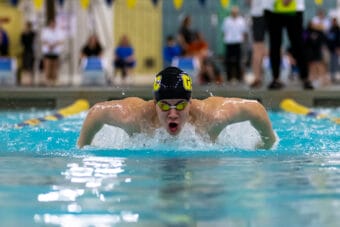
One of Alaska’s most beloved athletes, Olympic champion cross-country skier Kikkan Randall, is participating in this year’s Winter Olympics — not as a competitor but as a commentator for NBC, covering the Beijing games from NBC’s studios in Connecticut.
Randall is helping analyze the events for TV viewers nationwide and stoking the competitive fire for young and old skiers alike.
Randall says after competing in the previous five Winter Olympic Games, this year has been a unique experience, especially with a focus on the up-and-coming, relatively young U.S. ski team.
Listen here:
The following transcript has been lightly edited for clarity.
Kikkan Randall: It’s been really interesting to watch this Olympics from the other side of the screen. This is the first time in five editions I haven’t been a part of the team myself. So it’s been unique to take my experience and then now watch the U.S. team, watch the U.S. athletes. And what I’ve noticed is just the shift in expectation, the shift in professionalism.
This team coming in, I think, had probably the highest expectations the team has ever had, mostly on the shoulders of Jessie Diggins, who comes in as an Olympic medalist already but also could contend theoretically in all six events. But then, also, this young team that has shown some of the best results at the World Junior Championships and their first couple years in the World Cup — a lot of hope pinned on them but a hard position to be in, given that they really are so young in the sport.
So, you know, I think the Olympics, the way it’s unfolded in the first week, has really shown why the Olympics is so challenging. It’s when the world is trying to be at their absolute best. And you see those countries that just have so much tradition, and so much resource and such a depth of team, can really come in and perform. And I think the U.S. team, while they have made so many strides, they’re still really developing in terms of the depth and bringing the resources up to speed.
The conditions have been pretty challenging. There’s been the altitude factor, there’s been the snow conditions. And you’ve got to give the credit to these athletes. This games has been intense on a whole ‘nother level because of all the COVID issues. And so the fact that they’ve all come in, they’ve kept a good perspective, they’ve all laid their best effort out, they’ve all been super honest about how they’re feeling and giving their best.
And I think while we haven’t had as many, you know, a ton of metals, I think it’s been a really successful games so far. And I think now that we’re halfway through the games, the athletes could still really be kind of figuring things out and could finish the games strong.
Casey Grove: I think it’s safe to say that they’ve been successful with their outfits at least, right? With the stripy, red, white and blue outfits that I think you sort of pioneered, right?
Kikkan Randall: I think the suits do look fantastic. I love that when they’re in the field, you can see where the American team is. And so, really cool to see that out there. And as a commentator, I can tell you, it’s really helpful, because all those suits start to blend together. And when you can really talk to what the Americans are doing in the group, it’s really helpful.
Casey Grove: Yeah, no doubt, as a spectator too. Tell me more about that. Because the way this works is, you’ve got to watch some monitors really closely to be able to talk about what’s going on in the race. Has that been challenging, I guess, being remote? And would you, without COVID, would you have normally been at the games?
Kikkan Randall: I think it’s been a mixed bag for commentators over the last two Olympic cycles. I believe in Sochi, the commentators were on-site. And then for Pyeongchang, Chad Salmela and Steve Schlanger, who I’m commentating with here, who called the gold medal race, they were calling it from Connecticut here.
I mean, I’m appreciating now what it takes to produce the Olympic Games, across the myriad of sports and all the roles it takes. So I can appreciate why it’s just a little bit more effective to do from the studios here, where the infrastructure is in place. To be honest, I think if I was at the venue, I would still be staring at a screen, probably not un-different to what I’m doing now. The benefit of being on-site would be the chance to interact more with the teams and with the athletes.
But in terms of just here, being able to do the job, I’ve got two screens in front of me, I’ve got the split times, I’ve got a device called the Hawkeye that’s feeding the information from our research team. I’ve got papers spread out all over the desk of former results, and you know, bios and various things. So it’s really a cool setup to really be able to simultaneously be working through what happened in the past, who are these athletes, what’s going on in the snow. And then also, I’m looking through Plexiglas to my other two commentators, and we’re playing off each other in this kind of intricate dance of all each playing our role. So it’s just been a fantastic, really fun experience.
Casey Grove: For you personally, having been on the team, you won a gold medal in the last Olympics. What’s it like now, sort of from the other side, like looking at it as a commentator? How does that feel?
Kikkan Randall: I was really curious to see what kind of feelings, emotions, thoughts I would have, being on this side of the screen for the first time in a long time. I think being able to end my career on the highest of high notes, to be able to leave my career feeling like I did everything I wanted to do, really left me feeling content to move on to this next chapter of my life. And so to come back four years later, and watch the sport now, I am just so grateful that I just have a genuine love of the sport.
I find myself intrigued about what’s going to happen. And I love really thinking critically now about what’s going on up there — you know, is the wax playing a factor? What have the athletes done for training? How are they playing out tactics? I just gets me excited.
And I’ve loved that after 20 years, when I could have easily been like, “Alright, well, that was very intense, I’m going to go do something totally different. I have no interest in skiing,” I’m the opposite. I’m still a super fan. I love being able to see what’s happened in the four years that I’ve been gone, and to see the team doing so well. And to see the athletes, the rookies, coming into their first Olympics, for the veterans, you know, doing a good job performing under pressure. And it’s just been really good.
And I really can’t have done it in a better way. The competitor in me, you know, I’m seeing the sprint course and going, “Oh, that would have played my strengths. You know, that would have been really fun.” But I don’t really regret my decision to finish my career four years ago.
Casey Grove: There’s a lot of ways to sort of measure success, and there’s a lot of different victories happening out there. But I wanted to ask you, in particular, about Hannah Halvorsen and the long journey it’s been for her to make it to the Olympics.
Kikkan Randall: Hannah’s story is incredibly inspiring. And as her former teammate, I’m just incredibly proud to see her journey back from that horrific accident two years ago, where, I mean, her life was in jeopardy.
She was casually crossing the street in downtown Anchorage, you know, a place I’ve lived almost my entire life. Her training had really just been clicking, like, hitting stride. I think everybody was looking forward to that season to see how she would do. And bam, in an instant, she was hit by a car, you know, thrown down the street, traumatic brain injury, horrific injury to her legs. And that could have been the end of her career right there.
But Hannah just has always been such a wise soul. And she she just took it in stride. I mean, I know there were difficult moments. But in her mind, it was never a question of whether or not she was going to come back. And she just had the patience. She surrounded herself with great support, to recover from her injuries and I think has gradually worked her way back. And in just two years, to be named the Olympic team to come in, you know, she got a top 10 in a World Cup earlier this season. She just comes in, and I really hope for her that she’s really been able to soak in all that is the Olympic experience, because it’s hard not to get to the games and then feel like you want to, like you need to win a medal to be successful.
But for her, her medal is to be there. And I mean, she is a strong representative of Team USA. And I think she still has a bright future ahead. Like really, at her age, the next four years I think are going to be when her her career could really hit its stride. So to get this experience now, to get that kind of reward for the comeback she’s made, it’s just absolutely inspiring. And Hannah’s the nicest, sweetest person ever, such a competitor, and yet just such a wonderful complement to the team. So it’s been wonderful to see the story play out.
Casey Grove: Yeah. Well, what are you looking for in the races here coming up this week?
Kikkan Randall: Well, the team sprint is the next race on the calendar. And that is always a great event for the sport of cross-country. It receives some of the biggest viewing numbers. You know, personally, I think it’s one of the most exciting races because it’s two athletes. It’s generally kind of a combination of the sprint speed with the endurance capacity. So a lot can happen over each of the three legs for each skier. Jessie and I won the gold medal in 2018 in this event, however, that was in the freestyle technique. So now we switch back to classic. Traditionally, the U.S. team has not been as strong at classic, although we do have a silver medal from 2017, when Jessie Diggins and Sadie Bjornsen teamed up. So I think that provides a lot of confidence that when the team gets the skis right, when the athletes are in a good place, the U.S. can absolutely contend for a medal. And as we know, we’re a day away from the event as we look into it. Sweden will no doubt have a strong team. The Russian Olympic Committee will have a strong team. Finland will have strong team. But the U.S. can argue that they all have a strong team. So really looking forward to that in the women’s race.
I think in the men’s race for the U.S. team, probably not a medal contender, but a great opportunity to put maybe a couple of the younger guys in there to gain experience. And then in terms of the fight for the medals, I think it’s going to be really intriguing. You know, Norway’s is feeling a little bit wounded right now because the Russian Olympic Committee has certainly dominated these championships, so they’re going to be looking for some redemption. But R.O.C. will definitely be the team to beat. And you know, I think Finland can make a play in there. Italy’s looking strong. So it’s just going to be so exciting. And I think as a fan, as a commentator, the most you want is to come in with really competitive events where you’re like, “I don’t know who’s gonna win.” And that’s kind of how I feel coming into this. And I think in the women’s U.S. team is definitely kind of the underdog. And that was the position we were in four years ago. So I just can’t wait.
Casey Grove: Yeah, it definitely is super exciting, and so many different storylines going on. Well, Kikkan, as the executive director of Nordic Skiing Association of Anchorage, and an Anchorage skier that people see around here, I wonder, what do you think this means for kids growing up skiing right now, to see folks from the United States or from Alaska, you know, competing in these games? What do you think about that?
Kikkan Randall: I’m really excited for the opportunity we have. And what I’ve noticed in my role with NSAA so far, is that over the last 50 years of cross-country skiing really kind of coming to form in Anchorage, so many amazing things have been accomplished. I mean, great culture of skiing, lots of people out there doing it, strong programs. And yet, we still have an opportunity to grow the sport, whether that’s participation, whether that’s our competitive athletes, and I believe there’s still things we can do within the ski community to build that excitement.
So the Olympic Games, what it can do is it can provide that interest, that inspiration. I’m thinking back to eight years ago, when I was in a position to be, I was the gold medal favorite, coming into the skate sprint, and just how much excitement and enthusiasm there was in Anchorage. And at that point, eight years ago, Gus Schumacher was 13 years old. Hannah Halverson, you know, early teens. So they were just starting to dream about what the Olympics could mean to them. And now those athletes come in, they’re the new generation inspiring.
So what kids do we have sitting out there in, you know, in Anchorage, or anywhere in Alaska? They’re starting to be like, “I think I want to go to the Olympics.” And now they’re not just dreaming about going to the Olympics, they’re dreaming about winning medals, because we’ve proven in the last four years that Americans can win. And that’s exciting. So I’m excited about the inspirational value of of these Olympics going on, and I just wanted to play my part to help build that enthusiasm, because I really believe it’s an amazing sport. It’s an amazing lifestyle, and the more we can get kids and families pulled into the sport for their own health, for the camaraderie, and then ultimately send a bunch more Alaskans to the Olympics, that would be fantastic.
For the men’s relay the other day, I didn’t quite get it in on on my commentating, but I wanted to: Three of the four members on the U.S. Men’s relay team are Alaska state ski champions. And I think that’s pretty cool to see some real homegrown Alaskans on that team. You know, Luke Jager, skied leg number one, Scott Patterson, leg number two and Gus Schumacher, leg number three. Let’s get an all Alaska relay team on their someday.



